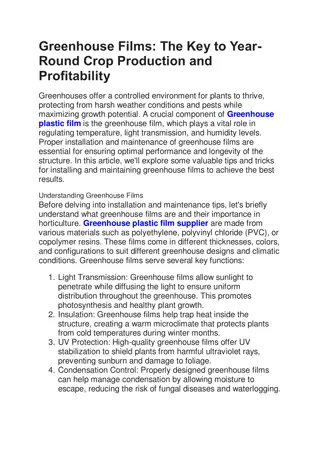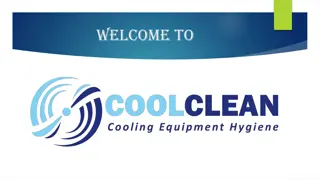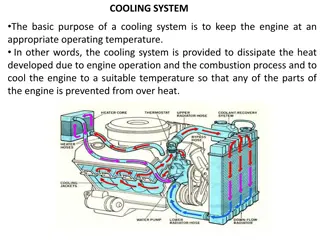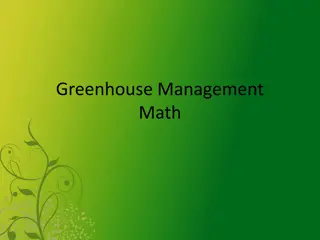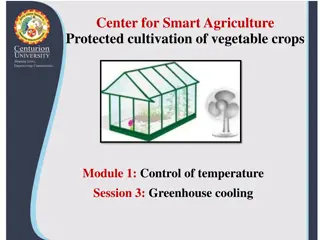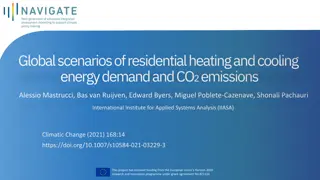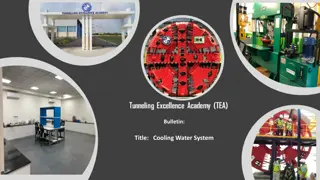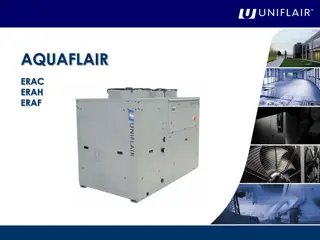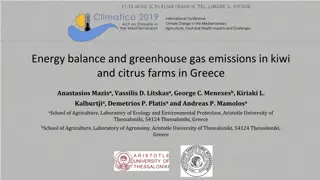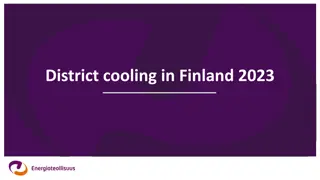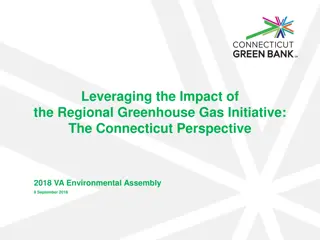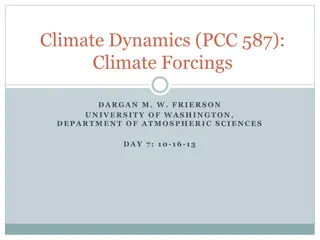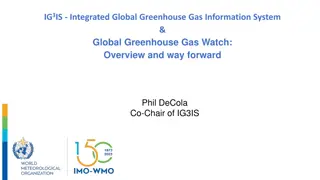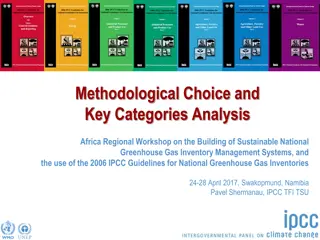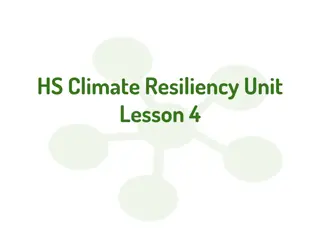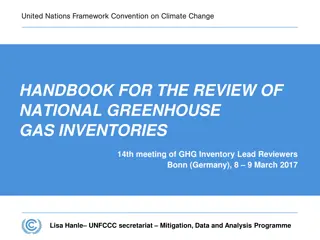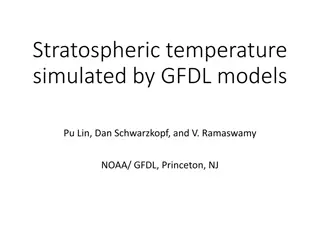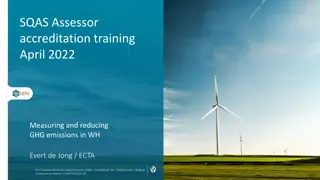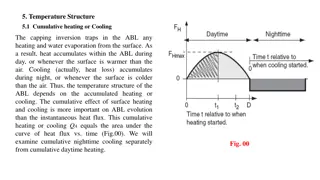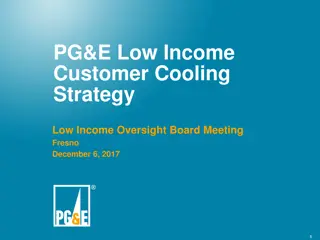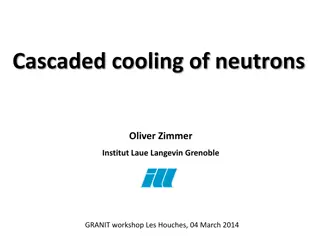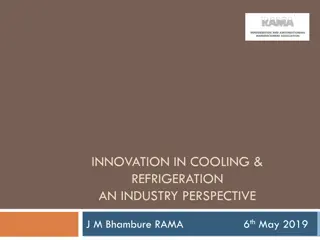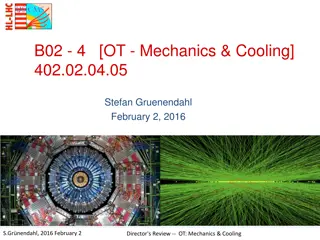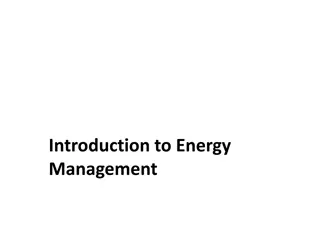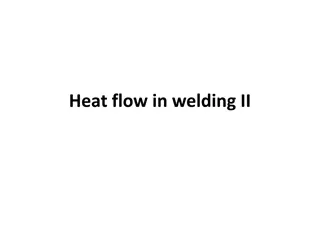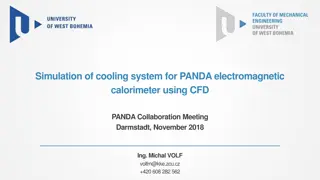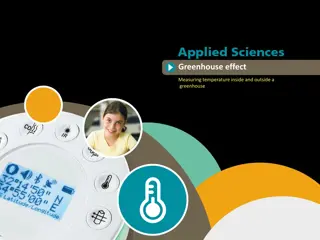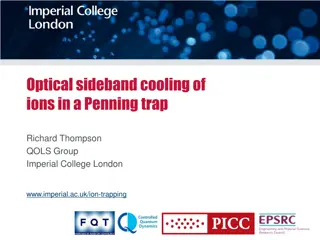Protocol: Cooling Basics, Clinical Considerations, and Phases of Care
The essentials of cooling protocols and clinical considerations, focusing on temperature management, thermoregulation basics, effects of hypothermia/cooling, central temperature measurement, and factors influencing target temperature. It emphasizes the importance of safe monitoring and application o
2 views • 72 slides
Understanding Human Contribution to Climate Change
Learn how human activities contribute to climate change by emitting greenhouse gases, leading to the greenhouse effect and global warming. Explore the impacts of climate change, recognize greenhouse gases, and comprehend the vital role humans play in influencing Earth's climate system through variou
1 views • 9 slides
Cryogenic Sub-systems
Explore the relationship between liquefaction, refrigeration, and isothermal processes in accelerator systems. Understand the equivalent exergy in Watts for different gases at 1 bar and 300K. Calculate the reversible input power required for latent cooling and the total cooling in different scenario
1 views • 9 slides
Greenhouse Films: The Key to Year-Round Crop Production and Profitability
Greenhouses offer a controlled environment for plants to thrive, protecting from harsh weather conditions and pests while maximizing growth potential. A crucial component of Greenhouse plastic film is the greenhouse film, which plays a vital role in regulating temperature, light transmission, and hu
9 views • 4 slides
From Farm to Future: Greenhouse Films Redefining Agriculture
Greenhouse farming has revolutionized agriculture by extending growing seasons, improving crop quality, and maximizing yields. At the heart of this innovation lies greenhouse films, which act as a protective shield, creating an optimal environment for plants to thrive. In India, the burgeoning deman
2 views • 3 slides
Coolclean Cooling Tower Service Benefits
Coolclean carry out comprehensive cooling tower servicing to not just clean, but to also ensure that the cooling tower cools to its maximin efficiency, to reduce water and chemical usage, to reduce electrical power consumption, to reduce environmental damage, to control bacteria growth, and comply w
1 views • 3 slides
Advanced Microbunched Electron Cooling for EIC Design Overview
Microbunched electron cooling is a cutting-edge technique proposed for the Electron-Ion Collider (EIC) design, aimed at enhancing beam properties through coherent electron interactions. The concept utilizes Coherent Electron Cooling (CeC) and broad-band amplification in the form of Micro-bunched Ele
1 views • 16 slides
Advanced Cooling Solutions for Immersion Servers by Asperitas
Asperitas offers an innovative immersion cooling solution for servers, featuring the AIC24-15/19/21 technology with advanced power and compute densities. The integration solution includes power delivery, management, cooling, monitoring, and containment features for optimal performance. Their Shell I
1 views • 19 slides
Understanding Engine Cooling Systems
The cooling system in an engine is vital for maintaining optimal operating temperatures, preventing overheating, and ensuring efficient combustion. There are different types of cooling systems such as air cooling and liquid cooling, each with its advantages and disadvantages. Air-cooled engines rely
0 views • 23 slides
Greenhouse Management and Temperature Control Guide
Learn about the importance of ventilation and temperature control in greenhouse management, including how to calculate required ventilation and heater size. Understand the benefits of proper ventilation, ways to control greenhouse temperature, and essential considerations for heating. Explore step-b
1 views • 21 slides
Efficient Greenhouse Cooling Systems for Smart Agriculture
Active summer cooling systems like fan-and-pad and fog systems are crucial for maintaining optimal temperatures in greenhouses. These systems work by utilizing evaporation to remove heat from the air. Fan-and-pad cooling systems have been in use since 1954, where water is passed through pads to cool
1 views • 23 slides
Global Scenarios of Residential Heating and Cooling Energy Demand
This study presents global scenarios of residential heating and cooling energy demand and CO2 emissions, focusing on the evolution of building stock, energy demand, and emissions for space heating and cooling. The research aims to address the limitations in current global scenario studies by develop
8 views • 5 slides
Cooling Water Systems in Construction: Overview and Risk Management
Understanding the operation of cooling water systems in construction, specifically focusing on cooling towers and their usage in Tunnel Boring Machines (TBMs). Importance of proper maintenance to prevent the growth of Legionella bacteria and mitigate the risk of Legionnaires' disease. The process of
0 views • 6 slides
Overview of Aquaflair and Uniflair Chillers
The AquaflairERACERAHERAF1 series features state-of-the-art technology for maximum reliability and efficiency. With cooling capacities ranging from 50 to 110 kW, these chillers utilize environmentally friendly R410A refrigerant and electronic thermostatic valves for energy efficiency. The ERAC, ERAH
0 views • 96 slides
Energy Balance and Greenhouse Gas Emissions in Agriculture
This study explores the energy balance and greenhouse gas emissions in kiwi and citrus farms in Greece, highlighting the significant impact of agriculture on global energy consumption and climate change. It discusses the distribution of energy consumption in agri-food chains, shares of energy in pro
6 views • 17 slides
District Cooling Trends and Companies in Finland
Explore the latest developments in district cooling in Finland, including the increase in connected load and energy production capacity. Discover how energy companies are contributing to the growth of district cooling services. Learn about the innovative production methods and energy sources utilize
0 views • 8 slides
Leveraging the Impact of the Regional Greenhouse Gas Initiative in Connecticut
Connecticut serves as a microcosm of the United States, facing significant energy challenges and environmental concerns. The state has adopted various approaches to climate policy, setting ambitious environmental goals such as reducing greenhouse gas emissions and promoting renewable energy sources.
0 views • 15 slides
Understanding the Greenhouse Effect and Its Impact
The greenhouse effect is the trapping of the sun's warmth in a planet's lower atmosphere, primarily by greenhouse gases like carbon dioxide and water vapor. These gases absorb and re-emit infrared radiation, which leads to an increase in temperatures. While carbon dioxide and water vapor are signifi
1 views • 13 slides
Understanding Global Warming and the Greenhouse Effect
Scientists attribute the observed global warming trend to human activities that enhance the greenhouse effect, trapping heat in the atmosphere. The greenhouse effect, crucial for life on Earth, involves gases like water vapor and methane that contribute to warming. Nitrous oxide, another potent gree
0 views • 13 slides
Understanding the Greenhouse Effect and Electromagnetic Radiation
The presentation delves into the science behind the greenhouse effect, explaining how human activities contribute to the enhanced greenhouse effect. It explores the composition of Earth's atmosphere, the role of greenhouse gases, and the impact of burning fossil fuels. Additionally, it covers the ba
0 views • 15 slides
Understanding Radiative Forcings in Climate Dynamics
Climate forcings directly impact global temperature by changing solar energy absorption and greenhouse gas concentrations. Shortwave forcings involve changes in solar radiation absorbed, while longwave forcings relate to greenhouse gases affecting the greenhouse effect. Positive radiative forcings l
1 views • 36 slides
Overview of IG3IS and Global Greenhouse Gas Watch
IG3IS, the Integrated Global Greenhouse Gas Information System, serves as a bridge between greenhouse gas measurement-based data and decision-making for governments and industries. It aims to quantify, attribute, and track changes in greenhouse gas emissions through a hybrid approach combining emiss
3 views • 12 slides
Understanding Methodological Choice and Key Categories Analysis in Greenhouse Gas Inventory Management
Methodological choice and key categories analysis play a crucial role in managing uncertainties in greenhouse gas inventories. By prioritizing key categories and applying rigorous methods where necessary, countries can improve the accuracy and reliability of their emissions estimates. Key categories
0 views • 24 slides
Understanding Climate Resiliency and Greenhouse Gases in High School Lessons
In this high school climate resiliency unit lesson, students explore the concept of albedo and its impact on temperature changes. They investigate factors affecting temperature, calculate temperatures based on albedo, and delve into understanding greenhouse gases and their contributions to climate c
0 views • 16 slides
Handbook for the Review of National Greenhouse Gas Inventories - Overview and Implementation Guide
This document provides a comprehensive guide for the review of national greenhouse gas inventories, detailing the history, development, and key components of the handbook. It covers reporting requirements, review processes, sector-specific guidance, and incorporation into your work as a Lead Reviewe
0 views • 10 slides
Simulation of Stratospheric Temperature by GFDL Models: Observations and Trends
Interannual variations of stratospheric temperature since 1979 are well simulated by GFDL models, showing general cooling trends, stronger cooling over Southern Hemisphere high latitudes, post-eruption warming, delayed cooling after eruptions, and flat trends in the 2000s. However, models tend to ov
0 views • 10 slides
Greenhouse Gas Emissions Management in Warehouse Operations
The SQAS Assessor accreditation training in April 2022 focused on measuring and reducing greenhouse gas emissions in warehouse operations. The content covers emission questions, scope of emissions, energy consumption examples, disaggregation of emissions, emission intensity calculation, and strategi
0 views • 17 slides
Understanding Temperature Structure and Cumulative Heating/Cooling in Atmospheric Boundary Layer
The temperature structure in the atmospheric boundary layer (ABL) is influenced by cumulative heating or cooling effects from the surface. During the day, heat accumulates within the ABL, while cooling occurs at night. The cumulative heating or cooling is more crucial for ABL evolution than instanta
0 views • 12 slides
Understanding the Greenhouse Effect and Global Warming
The greenhouse effect, caused by gases like carbon dioxide in the atmosphere, is essential for Earth's temperature regulation. However, human activities have led to an enhanced greenhouse effect, resulting in global warming. Learn how this natural process works and its impact on climate change.
0 views • 20 slides
Advanced Cooling Solutions: ACS Cold Plate Focus Areas
Introduction to ACS Cold Plate focus areas led by Jessica Gullbrand from Intel. The objective is to standardize liquid-cooled solutions without hindering innovation. The ongoing focus includes approval of cold plate requirements, initiation of Open Rack V3 Blind Mate Liquid Cooling, and various work
0 views • 20 slides
Cooling Strategies for Low-Income Customers in California
Learn about PG&E's initiatives to provide cooling strategies for low-income customers, including CARE funds for Cooling Centers and ESA-provided Cooling Measures. Regulatory guidance ensures long-term energy consumption reductions without burdening low-income ratepayers. Find out what Cooling Center
0 views • 12 slides
Advancements in Neutron Cooling Techniques and Paramagnetic Systems
The presentation discusses cascaded cooling of neutrons and Namiot's proposal for phononless cooling to low temperatures using polarized deuterons. It explores inelastic scattering cross-sections, candidate paramagnetic systems, and excitations in O2. Additionally, it covers rate constants, superflu
0 views • 11 slides
Innovation in Cooling & Refrigeration: Industry Challenges and Opportunities
This presentation explores the current state of cooling and refrigeration in India, highlighting the significance of innovative technologies in addressing the growing demand for efficient cooling solutions. The discussion includes insights on India's climate zones, cooling needs, refrigeration deman
0 views • 13 slides
Colorado Greenhouse Gas Tracking & Reporting Overview
This content provides detailed information about Colorado's Greenhouse Gas Tracking & Reporting, Greenhouse Gas Reduction Targets, Verification Workbook, Emission Rates, and Key Items for Reporting/Tracking in a Day Ahead Market or RTO. It outlines the methodology, targets, and requirements for redu
0 views • 5 slides
Director's Review - Mechanics & Cooling Overview
The US will design and build the central portion of the Phase 2 Tracker Barrel Pixel Strip Detector (TBPS), focusing on mechanics and cooling. The project involves three layers of PS modules with specific lengths, utilizing carbon fiber/carbon foam sandwich planks with embedded CO2 cooling. Collabor
0 views • 19 slides
Understanding Evaporative Cooling and Cooling Towers in Energy Management
Dive into the world of evaporative cooling and cooling towers with this detailed chapter. Learn about direct and indirect cooling processes, psychrometric phenomena, range and approach in cooling systems, different airflow arrangements in cooling towers, and the theory behind evaporative cooling. Di
0 views • 20 slides
Welding Heat Flow and Cooling Rate Calculations
Understanding welding heat flow and cooling rate calculations is essential for determining the critical cooling rate in welding processes. Factors such as plate thickness, number of passes, and relative plate thickness play a crucial role in selecting the appropriate equations for calculating coolin
0 views • 10 slides
Simulation of Cooling System for PANDA Electromagnetic Calorimeter
A detailed study on optimizing cooling system design for the PANDA electromagnetic calorimeter using Computational Fluid Dynamics (CFD) to enhance temperature stability and light yield efficiency. The simulation focuses on factors like cooling tube arrangement, mass flow rate, and fluid properties i
0 views • 11 slides
Understanding the Greenhouse Effect: Measuring Temperature Inside a Greenhouse
Explore the concept of the greenhouse effect by studying temperature variations inside and outside a greenhouse. Learn about the impact of sunlight radiation on temperature levels, the importance of greenhouses in agriculture, and the similarities between a greenhouse and the Earth's natural greenho
0 views • 25 slides
Optical Sideband Cooling of Ions in a Penning Trap - Research Summary
Researchers at Imperial College London, led by Richard Thompson, have made significant contributions in the field of optical sideband cooling of ions in a Penning trap. This technique involves laser cooling in the trap, large Lamb-Dicke parameters, sideband cooling of ions, coherent manipulation of
1 views • 34 slides



